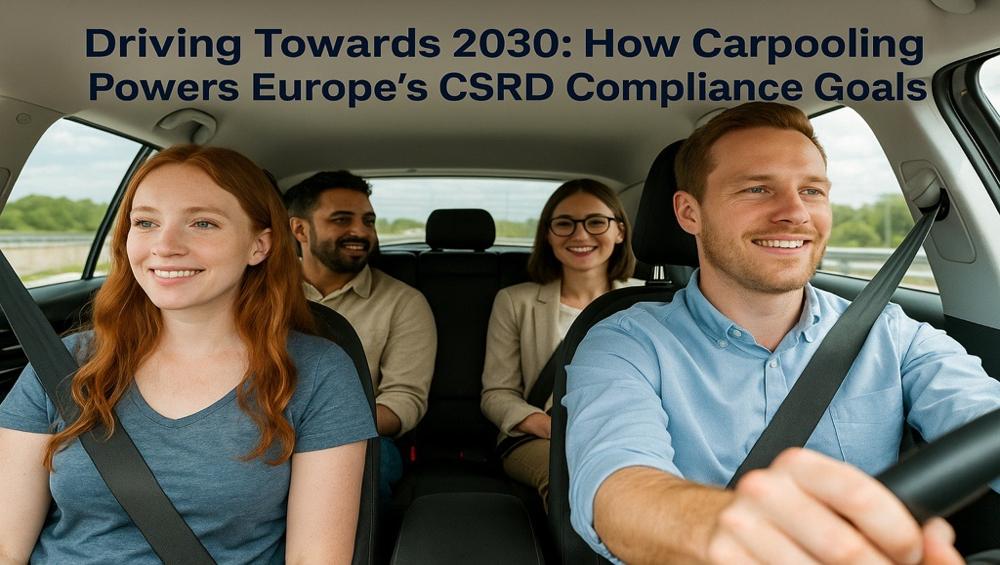
Carpooling Drives Europe’s 2030 CSRD Goals
Europe is on an ambitious journey towards a more sustainable future, with the Corporate Sustainability Reporting Directive (CSRD) serving as a key roadmap. For businesses across all industries, understanding and actively contributing to CSRD compliance is not just an option, but a strategic imperative.
This directive calls for comprehensive reporting on environmental, social, and governance (ESG) factors, urging companies to look closely at their operations and impacts. A significant focus of the CSRD, particularly for emissions, is the rigorous tracking and reduction of greenhouse gas (GHG) emissions across all scopes – including the often-overlooked Scope 3 emissions, which cover indirect emissions from sources not owned or controlled by the organization, such as employee commuting (European Commission, n.d.).
Carpooling: A Powerful Lever for Emissions Reduction
Employee commuting represents a substantial portion of Scope 3 emissions for many organizations. While the widespread adoption of electric vehicles is crucial for long-term decarbonization, the reality is that conventional combustion-engine vehicles will continue to be a significant part of daily commutes for years to come. This is where carpooling emerges as an immediate and impactful solution for emissions reduction.
Consider the data: An average passenger vehicle can emit approximately 0.148 kg of CO2 per kilometer, a figure that can vary based on vehicle type, fuel, and age (RVO, 2020). When two or more commuters share a ride, they effectively reduce the emissions per passenger kilometer. Imagine the collective impact: if a significant portion of daily commuters chose to carpool, the reduction in overall CO2 emissions would be monumental.
The aggregation of individual shared rides across a region or country demonstrates the immense scalability and real-world environmental benefits of shared mobility, highlighting its potential to significantly reduce the carbon footprint of commuter travel.
Carpooling directly contributes to emissions reduction by:
- Decreasing the Number of Vehicles on the Road:
Fewer individual cars traveling to the same destination means less fuel consumed and significantly lower overall emissions. - Alleviating Traffic Congestion:
Reduced traffic density leads to less idling time for vehicles. This not only saves fuel but also lowers associated emissions, as studies consistently show that congestion adds considerable time to commutes annually, directly impacting emissions (INRIX, 2023). - Optimizing Vehicle Utilization:
By filling empty seats, carpooling ensures that existing vehicles are used more efficiently. This approach delays the need for new vehicle manufacturing and the associated embodied emissions from production.
Beyond Emissions: Holistic CSRD Contributions
While emissions reduction is a cornerstone of CSRD compliance, carpooling offers broader contributions to a company’s overall sustainability profile, touching upon the social and governance aspects of ESG:
- Social Impact (S in ESG):
Carpooling can foster a stronger sense of community among colleagues, encourage social interaction, and even reduce the stress associated with daily commuting. This aligns with the “own workforce” aspect of the European Sustainability Reporting Standards (ESRS S1), demonstrating a tangible commitment to employee well-being and a positive work environment (EFRAG, 2022). - Resource Efficiency:
Beyond just fuel, reducing vehicle usage translates to less wear and tear on infrastructure and a reduced demand for raw materials used in vehicle manufacturing and maintenance. - Cost Savings:
For both individuals and businesses, carpooling can lead to significant cost savings. For companies, this might include reduced demand for parking infrastructure or optimization of company fleet usage, aligning with principles of responsible resource management and economic sustainability.
Embracing the Future of Sustainable Mobility
For businesses aiming to meet their CSRD compliance goals by 2030, embracing solutions like carpooling is a logical, verifiable, and impactful step. It provides a direct mechanism to address Scope 3 emissions, enhance employee well-being, and demonstrate a clear commitment to corporate social responsibility. The integration of well-designed carpooling programs can offer organizations a practical pathway towards a more sustainable and compliant future.
For companies exploring how to implement such initiatives effectively, there are B2B carpooling applications like ColiRide®, designed to provide the necessary technological infrastructure and support. This platform can help facilitate seamless program implementation, enabling businesses to track their progress, quantify their environmental impact, and confidently report on their contributions to a greener, more sustainable Europe.
References
- EFRAG. (2022) ESRS S1 – Own Workforce.
Available at: https://www.efrag.org/sites/default/files/sites/webpublishing/SiteAssets/ED_ESRS_S1.pdf (Accessed: 2 June 2025). - European Commission. (n.d.) Corporate Sustainability Reporting Directive (CSRD).
Available at: https://finance.ec.europa.eu/capital-markets-union-and-financial-markets/company-reporting-and-auditing/company-reporting/corporate-sustainability-reporting_en (Accessed: 2 June 2025). - INRIX. (2023) Global Traffic Scorecard 2022.
Available at: https://inrix.com/scorecard/ (Accessed: 2 June 2025). - RVO. (2020) Kosten autobezit en klimaateffecten auto’s.
Available at: https://www.rvo.nl/onderwerpen/brandstofprijsvergelijking/kosten-autobezit-en-klimaateffecten-autos (Accessed: 2 June 2025). - U.S. Environmental Protection Agency. (2024) Greenhouse Gas Emissions from a Typical Passenger Vehicle.
Available at: https://www.epa.gov/greenvehicles/greenhouse-gas-emissions-typical-passenger-vehicle (Accessed: 2 June 2025).